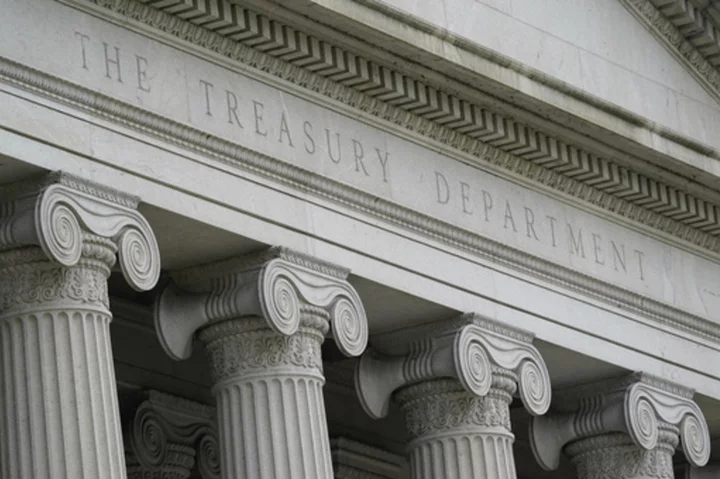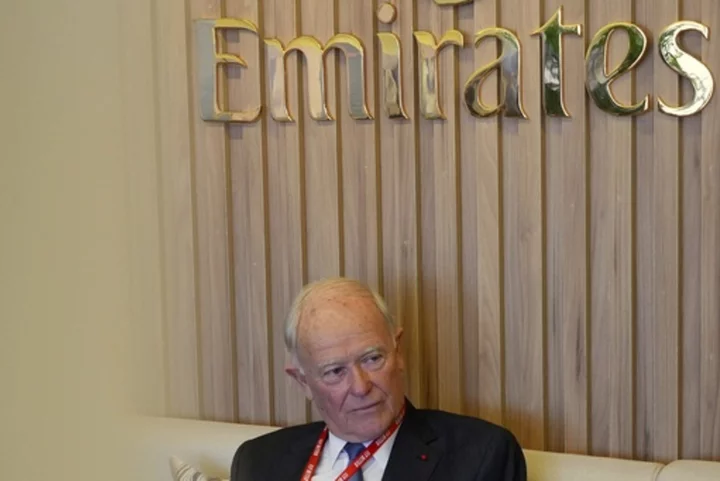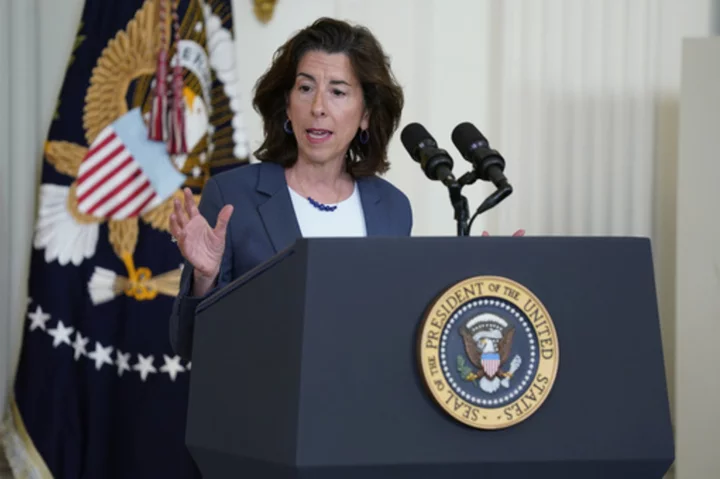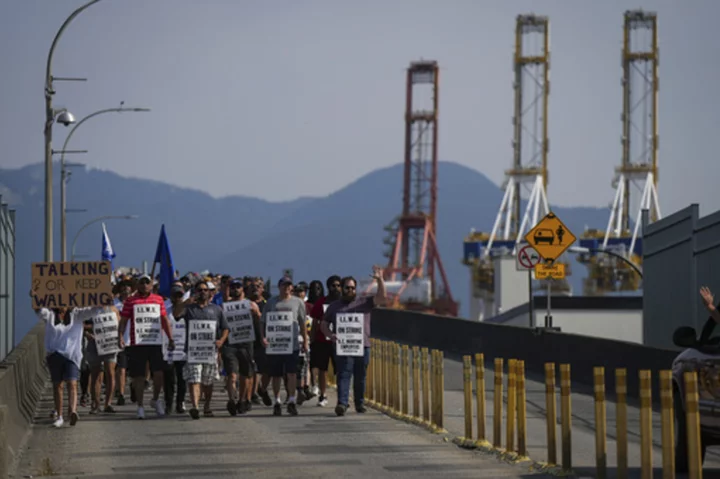Governor Ron DeSantis has presided over a period of eye-catching growth for Florida’s $1.1 trillion economy. He’s betting the surge can help carry him into the White House, even though more of the Sunshine State’s workers are being left behind.
Hiring shot up and real-estate values soared in Florida during the pandemic, and an influx of billionaires, including Citadel founder Ken Griffin in Miami and tech investor Cathie Wood in St. Petersburg, added Wall Street glitz. The state’s status as a sporting capital continues to rise as well, with international soccer star Lionel Messi close to agreeing to join the Inter Miami Major League Soccer franchise run by David Beckham.
Florida has long attracted workers and retirees looking to escape high taxes and cold winters elsewhere, and DeSantis’s relaxed approach to Covid-19 and pugilistic brand of cultural conservatism lured a new crowd.
Read more: Super-Rich Escaping to Miami Are Insulated From Crime Realities
“His appeal for me was that he kept the state open. That was a big issue. My kids not having to wear masks was an issue,” said Steven Hertzberg, a technology entrepreneur who moved to the Ponte Vedra Beach area, near Jacksonville, last year from northern California.
Recent economic gains haven’t been broadly shared. While a new class of well-compensated professionals has flocked to the state, following their financier bosses south, many lower-paid workers are having trouble remaining afloat amid the rising tide of wealth. Paychecks are failing to keep up with a torrid increase in rents, and the property boom has put homeownership out of reach for many.
With the 44-year-old Republican DeSantis at the helm, Florida’s economy expanded about 11% from 2019 to 2022, roughly double the growth of California, Texas or New York over the same period. On its own, Florida would rank as the world’s 18th-biggest economy, coming in just behind the Netherlands and ahead of nations including Indonesia, Saudi Arabia and Turkey, according to data from the World Bank.
Florida helped lead the charge out of the brief but deep swoon that pushed the US economy into recession in the spring of 2020. But the unique conditions that made the state’s burst of growth possible — including an epochal shift toward working from home and a massive federal response to the economic pain created by the pandemic — seem unlikely to be repeated or easy to reproduce with other policy changes.
DeSantis benefited from billions of dollars in federal pandemic relief and infrastructure funds, which allowed him to balloon the state budget to $117 billion for the fiscal year starting July 1, a 31% increase from when he took office in 2019. Much of that outlay came in the form of tax relief, even though Florida’s tax advantages compared with other states are longstanding. It has no state income tax, and has long let homeowners lock in favorable property-tax rates.
Former President Donald Trump, DeSantis’s chief foe in the race for the GOP nomination, has alluded to how his administration’s policies helped bolster the governor’s fortunes. Trump's CARES Act pandemic aid legislation gave Florida $8.4 billion.
“Florida was doing GREAT long before Ron DeSanctus got there,” Trump said in a February post on the Truth Social platform, in one of the many jabs he and his campaign have lobbed at DeSantis’s record. “SUNSHINE AND OCEAN, very alluring!!!”
Lower-paid workers have seen smaller income gains even as home prices and rents soar. According to Zillow’s Observed Rent Index, between 2019 and 2023, seven of the 10 biggest rent increases have been in Florida — with Cape Coral, North Port and Miami at the top, all experiencing over 50% increases in rents. The national average rent increase was about 31%.
The majority of jobs in Florida are in hospitality, health care and retail, according to Ned Murray, a professor at Florida International University who specializes in economics and housing. Though those jobs are plentiful, they don’t offer a high degree of economic security. Florida had the 37th lowest median wage in the US at $19.26 an hour in May 2022, according to US Bureau of Labor Statistics data.
“If you’re a worker, it’s hard to have quality of life right now,” Murray said. “There is a lot of job growth and low unemployment, but most of the employment is in the low-wage service sector.”
Still, for the first time since 1957, Florida has the fastest-growing population in the US, according to the Census Bureau, and it’s not only the very wealthy packing up and heading south. Ocala, a largely middle-class Central Florida city of 64,000 people and self-styled horse capital of the world, saw the biggest growth in one-way U-Haul trucks in the nation last year.
“In Florida we proved it can be done — we chose facts over fear, education over indoctrination, law and order over rioting and disorder,” DeSantis said in an hour-long, glitch-filled online chat where he formally announced his plans to seek the 2024 GOP presidential nomination. “Our results in Florida have been second to none, and we can and we must deliver big results for America.”
A governor’s actions can have a powerful effect on a state’s economy, especially in the immediate aftermath of a disaster. When Hurricane Ian severed Captiva Island, a beach retreat off the coast of Fort Myers, from the mainland, DeSantis pushed to repair a damaged causeway in 15 days. For local businesses, that provided a critical lifeline during the post-storm recovery.
“We thought it was going to be months,” said Andreas Bieri, owner of the Mucky Duck, a popular beachfront restaurant and bar. Soon after, Bieri voted to reward DeSantis with a second term, contributing to the largest margin of victory in a Florida gubernatorial election in 40 years.
But other, more lasting changes DeSantis has made could threaten many of the same businesses he helped after the storm. A new law that penalizes people who house or employ undocumented immigrants could force Bieri to close the Mucky Duck because he’s worried he won't be able to staff the restaurant. The bill requires employers verify workers’ immigration status and will suspend businesses that aren't compliant.
“I’m not so sure about what he’s been doing lately though, I’m a Republican but in my opinion he’s too extreme,” Bieri said of Desantis. “It could be that I have to close up, and if I have to close up, c’est la vie.”
Read more: DeSantis Made Florida Richer, Now He’s Making It Redder
Like Bieri, some prominent businesspeople have struggled to reconcile their support of DeSantis’s pandemic stance with his positions on cultural issues such as abortion, transgender rights and education. Thomas Peterffy, the founder of Interactive Brokers, has said he’s withholding support for DeSantis over social issues, and Steve Schwarzman, the co-founder of Blackstone Inc., is holding off on giving to Desantis’s campaign after meeting with him recently.
The immigration law could be especially nettlesome for companies that form the bedrock of Florida’s economy and rely on a steady supply of people willing to work for modest paychecks in hotels, restaurants and construction.
At the same time, lower wages have made it hard for many Floridians to keep up with rising costs. Miami and Tampa had the biggest year-over-year increases in consumer prices of any major metropolitan region in the US, according to the latest data from the Bureau of Labor Statistics, about twice the level of San Francisco and New York. In Miami, the median household has to pay 50.2% of their annual income to own a median-priced home, up from 33.7% two years ago.
Some people who flocked to the state in search of a higher standard of living have had to reverse course. Yvette Mendez, 62, moved to Miami in 2008 from the Bronx. She and her then-husband were tired of high rents and cold weather. But a month ago, she found herself back in New York City, living with her daughter in Brooklyn.
Mendez was evicted from her home in the southern Miami suburbs after falling behind on rent, which initially cost $1,500 a month in 2021 but shot up to $1,800 just six months after she had moved in. She scoured the county for a new place, but couldn’t find anything in her price range, and Mendez said she couldn’t afford the three months rent many landlords demand up front.
“I wanted to live somewhere tropical, the Sunshine State, as they say. Now it’s home, I definitely want to go back,” she said, hoping that rents will go down. “The governor, the people in charge, it’s like they want to see everyone in the streets.”
Billionaire and Republican kingmaker Peter Thiel has said the on-the-ground woes of Florida’s economy are finally catching up with DeSantis, leaving him little else to focus on besides the cultural stances that helped lift him to national prominence.
“What do you do about these runaway rents, these runaway housing costs? That’s a super hard problem to solve,” Thiel said on the podcast Honestly With Bari Weiss in early May. “I understand why DeSantis doesn’t talk about that, but it surely is a bigger problem.”
(Updates with Lionel Messi nearing agreement with Inter Miami soccer club in second paragraph.)
Author: Anna Jean Kaiser, Felipe Marques and Michael Sasso









